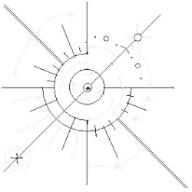1. The probabilities that A, B and C can solve a mathematics problem are 0.8 ,
0.75 and 0.6 respectively. If all of them try to solves it, find the probability that
(a) only A can solve the problem
(b) only A and B can solve the problem
(c) only two of them can solve the problem
(d) the problem can be solved.
About probabbility
2010-05-06 6:58 pm
回答 (2)
2010-05-06 7:08 pm
✔ 最佳答案
a. P(only A can solve)= P(A can solve) X P(B cannot solve) X P(C cannot solve)
= 0.8 X (1 - 0.75) X (1 - 0.6)
= 0.08
b. P(only A and B can solve)
= P(A can solve) X P(B can solve) X P(C cannot solve)
= 0.8 X 0.75 X (1 - 0.6)
= 0.24
c. P(only A and C can solve)
= P(A can solve) X P(B cannot solve) X P(C can solve)
= 0.8 X (1 - 0.75) X 0.6
= 0.12
P(only B and C can solve)
= P(A cannot solve) X P(B can solve) X P(C can solve)
= (1 - 0.8) X 0.75 X 0.6
= 0.09
P(only two can solve)
= P(only A and B can solve) + P(only A and C can solve) + P(only B and C can solve)
= 0.24 + 0.12 + 0.09
= 0.45
d. P(problem can be solved)
= 1 - P(problem cannot be solved)
= 1 - P(A, B and C cannot solve)
= 1 - (1 - 0.8)(1 - 0.75)(1 - 0.6)
= 0.98
參考: Physics king
2010-05-06 7:09 pm
(a)
P(only A solved) = P(A solved) x (1 - P(B solved) ) x ( 1 - P(Csolved) )
= 0.8 x (1 - 0.75) x (1 - 0.6)
= 0.08
(b)
P(only A and B) = P(A solved) x P(B solved) x (1 - P(C solved))
= 0.8 x 0.75 x (1 - 0.6)
= 0.24
(c)
P(2 of all) = P(only A and B) + P(only A and C) + P(only C and B)
= 0.24 + 0.8 x 0.6 x (1 - 0.75) + 0.6 x 0.75 x (1 - 0.8)
= 0.24 + 0.12 + 0.09
= 0.45
(d)
P(all) = 0.8 x 0.6 x 0.75
= 0.36
P(only A solved) = P(A solved) x (1 - P(B solved) ) x ( 1 - P(Csolved) )
= 0.8 x (1 - 0.75) x (1 - 0.6)
= 0.08
(b)
P(only A and B) = P(A solved) x P(B solved) x (1 - P(C solved))
= 0.8 x 0.75 x (1 - 0.6)
= 0.24
(c)
P(2 of all) = P(only A and B) + P(only A and C) + P(only C and B)
= 0.24 + 0.8 x 0.6 x (1 - 0.75) + 0.6 x 0.75 x (1 - 0.8)
= 0.24 + 0.12 + 0.09
= 0.45
(d)
P(all) = 0.8 x 0.6 x 0.75
= 0.36
收錄日期: 2021-04-19 22:08:38
原文連結 [永久失效]:
https://hk.answers.yahoo.com/question/index?qid=20100506000051KK00341

